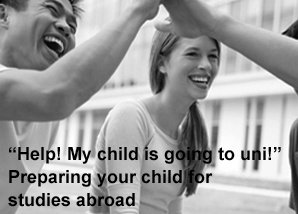
WHY STUDY ABROAD?

Experience Culture
Experience Growth
Experience People
College life affords them a newfound freedom with a great opportunity to learn life skills and become more independent2.
TRIALS AND TRIBULATIONS

Culture Shock
Culture shock is defined as “a sense of disorientation or confusion from being immersed in a new culture, way of life, or set of attitudes”3. When studying abroad, your child will be exposed to many unfamiliar things. Even the most basic of things like how to wait in line, speaking in the right tone, and appropriate levels of interaction could be different in a foreign country. We tend to ignore these social cues in our home countries because we have become used to the way things are done. Culture shock can usually be overcome in time, and your child can take certain steps to speed up the adjustment process. It is important to learn as much about the host country as possible, try to make local friends, and get involved with the community they are living in3.
Homesickness and Loneliness
Most students who choose to go overseas will experience homesickness and loneliness no matter how many friends they have. Homesickness, at its core, is just a longing for the familiar4. It is not really a longing for home per se, but when we are put in an unfamiliar situation we have an urge to revert to what we know. This is a very normal reaction to periods of rapid change and adjustment4. Loneliness can strike during the festive seasons or when your child hits certain milestones like getting their first job. Not being able to share these moments can be difficult5. It is important for you to reassure your child that what they are going through is normal and that accepting it is the best way to move past it. Encourage them to stay positive and focus on all the great new experiences they are having while abroad.
Fees and Living Costs
Last but not least, finances are probably the biggest concern when it comes to studying abroad. There are numerous costs including school fees and high living expenses. For example, Australian cities are frequently ranked as some of the world’s most livable but it comes with a very high price tag5. The annual cost of living for an international student in Australia is AUD$18,0126. With the inclusion of school fees, parents should be prepared to fork out about AUD 35,000 – 45,000 per year6. Depending on the exchange rate, this can turn out to be a huge cost. Parents can potentially save on foreign exchange rates with HSBC Premier’s benefits and transfer funds easily through HSBC’s Telegraphic Transfer.
It is crucial to instill the importance of spending wisely before your child heads overseas to give them a head start on financial management. Little things like picking the best value at the grocery store, taking public transport instead of taxis, and always paying your credit card bills on time encourages good spending behavior and saves some money while they’re at it6. Also, opening a bank account before heading overseas can help your child transition more easily while letting them travel without carrying a large sum of cash. HSBC Premier allows you to open a foreign HSBC account in Malaysia before they leave, and they will have immediate access to cash through any HSBC ATM. Your child also has access to emergency encashment abroad of USD2,000 on the spot. Additional emergency encashment up to USD8,000 is also available subject to the Account Holding Country approval.
THROUGH THICK AND THIN
As a parent, it is instinctual to want to protect your child from the dangers of the world while preparing them for life.
Here are a few different ways you can support them while they are away.
Help them, but not too much
Cover their finances
HSBC Premier’s international privileges can be a great help in this area due to its convenient and accessible nature. You may also take advantage of currency exchange rate fluctuations to potentially enhance your yield and accumulate foreign currencies to meet your future needs with HSBC’s Dual Currency Investment.
The Premier hotline is also available for round the clock emergency assistance to support you if any issues arise and your Relationship Manager is also available if you have further questions about your Premier privileges.

• Sources: 1 Internationalstudent.com, “10 Benefits to Studying Abroad”, June 28, 2013. 2 Moneycrashers.com, “10 Reasons Why You Should Study Abroad in College –
Benefits & Challenges”, February 2, 2012. 3 Gooverseas.com, “How to Deal with Culture Shock while Studying Abroad”, February 19, 2015. 4 Hercampus.com, “How to Deal with Homesickness Freshman Year”, August 9, 2016. 5 Topuniversities.com, “Studying Abroad: Pros and Cons”, March 16, 2015. 6 Topuniversities.com, “How Much Does it Cost to Study in Australia?”, June 24, 2015. 7 Greatergood.berkeley.edu, “How to Help Kids Adjust to College”, October 28, 2013. 8 Greatergood.berkeley.edu, “Self-Compassion for Freshmen”, October 8, 2013. 9 WSJ.com, “Should Parents Pay for Their Children’s College Education?”, March 16, 2014.























